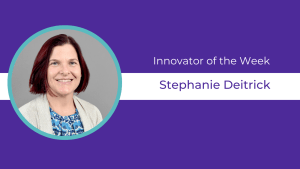Embedding evaluation into how Tempe does business

Title: Enterprise GIS & Analytics Manager
City: Tempe, Ariz.
There was no tinsel, ribbons, or bows, but Christmas came early for Stephanie Deitrick, when the Tempe City Council unanimously approved a sweeping new evaluation program on Dec. 1.
The new policy, a product of the city’s work with the Bloomberg Philanthropies City Data Alliance, moves the city’s focus away from one-off evaluations to one where understanding what works is deeply embedded across city government.
“While the city evaluates its programs, policies, and services in various ways, it does not currently have a standardized set of guidelines or guiding principles related to evaluations,” the council resolution reads. “Conducting meaningful, novel, and actionable evaluations will better enable City departments to achieve performance outcomes, increase efficiency, and provide greater accountability to the community.”
Deitrick was thrilled. “My hope was that by doing this, we could really start to push the idea that, culturally, evaluations are important. And that the idea of organizational learning about the services we provide, the way that we're spending taxpayer funds, the way that we're actually implementing services or programs, has real benefits.”
The policy will not require every city program to be evaluated—Deitrick feared that requirement would have made the policy into just another administration box to be checked annually—but instead will create an evaluation steering committee to look for promising candidates for evaluations, both among programs that are regular parts of the city budget as well as new supplemental requests.
Deitrick says her participation in specialized evaluation training in the City Data Alliance was key to getting buy-in from her city colleagues—she was pitching an idea that had the backing of Bloomberg Philanthropies, with which the city has a long, productive history.
“It wasn’t just me,” she says. “I had the whole initiative behind me saying, this is where cities are going, this is what you should be doing.”
She says she was also careful not to frame the policy as one that would bring negative consequences or was primarily focused on identifying programs that are underperforming. “The way it’s structured, it really hammers home the idea that we're doing this solely to learn,” Deitrick says. “Everybody’s involved in it together and you’re going to be supported.”
Pro tip: “If you really want to make a cultural change, you have to take the time and make it a priority. If you don't, then you're never going to take that next step.”


